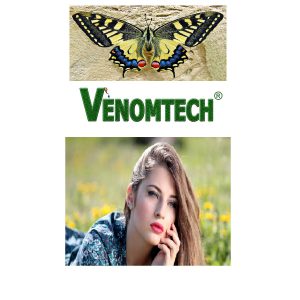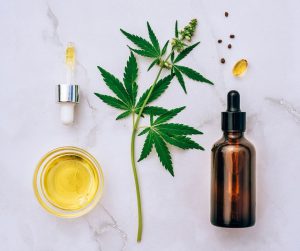Want to stay in the know when it comes to cosmetic ingredients? Delve into our bi-weekly round-up of the latest ingredients news and what that might mean for the industry.
Venomtech platforms venom-derived active ingredients

Venom-derived ingredients are not new to the beauty and personal care industry, but Venomtech claims its latest range of ingredients is bringing a new twist to this space.
Traditionally venom-based ingredients have been focused on the anti-ageing and anti-wrinkle areas of skincare, but the company’s latest range of venom-based actives is helping to bring new claims to this space, including soothing, hair growth, control of oily or dry skin, antibacterial and toning.

Venomtech’s portfolio of ingredients includes LiPep-5, an ingredient that is a biologically active peptide inspired by the lionfish and developed to mimic its ability to bind zinc and other metal ions. The company’s clinical trials have shown that the ingredients can protect skin by binding harmful zinc, giving it protection and anti-pollution skincare claims.
MorphoClense is the next ingredient in the portfolio and is derived from Swallowtail butterflies, which have developed the means to protect themselves from harsh environments, including the secretion of PLA2, which has anti-inflammatory properties. Inspired by this, the development team at Venomtech has designed MorphoClense to incorporate a four amino acid peptide to replicate the butterfly’s defence system, providing skin protection and anti-inflammatory properties.
ScorpSooth is derived from bark scorpions found throughout the Americas, a species that has developed resilience and inhibitory defence to protect themselves from the anti-inflammatory active of their own venom. ScorpSoothe replicated the effect of these soothing properties to bring a four amino acid peptide that also incorporates the PLA2 enzyme activity to bring soothing and protective properties to a range of skincare products.
Finally, ViPep-5 is derived from the venom of the carpet viper snake, which contains peptides to give them additional protection. ViPep-5 mimics the defensive peptide mechanisms to reduce free zinc by 87%, according to clinical trials, tackling the problem of environmental pollution that can contribute to premature ageing of the skin.
Geltor bioidentical collagen featured in new skincare line
This week, a new skincare line was launched in the North American market claiming to be the very first in the region to include human bioidentical collagen as a key ingredient in its formulation.
Orora Skin Science has recently launched two new skincare products that contain Geltor’s vegan bioidentical collagen ingredient – a moisturizer and a serum both targeted at the premium end of the skincare category.
The Canada-based company’s bioactive collagen cream also contains lactobacillus ferment to soothe the skin, as well as madecassoside for antioxidant protection, with squalene for moisturization, niacinamide to improve skin texture, Bifida ferment filtrate probiotic for skin health and hyaluronic acid for deep hydration.
But it is the formulations’ human collagen HumaColl21 by Geltor that is being featured as the star ingredient, with the skincare company promoting the fact that the ingredient mimics human collagen to make it more compatible with the skin and ultimately more effective.
“Featuring the first bioidentical human collagen ingredient and the proven effectiveness of HumaColl21 in beauty products is going to change the way customers experience skincare. Inspired by light and new discovery, we are excited to launch Orora with our breakthrough products, providing cutting-edge science in a luxurious and accessible way,” said Peter Lee, CEO of Orora.
California-based Geltor has developed the human collagen alternative as a biodesigned peptide with the INCI name sh-polypeptide-121, a technology that builds on the company’s reputation for biodesigned ingredients. It also produces Elastapure, which is biodesigned and manufactured in a plant-based fermentation process to replicate human skin elastin, ultimately enhancing skin elasticity.
HumaColl21 was launched last year, backed by clinical studies that demonstrate the ingredient’s ability to increase native collagen expression, making it more effective than retinol, enabling it to stimulate fibronectin production at a higher rate than retinol and vitamin C.
California reaffirms ban on hemp-derived CBD in cosmetics

The California Department of Public Health has issued a FAQ announcement to reaffirm the organisation’s current position on hemp-derived CBD in food, supplements and beauty and personal care products.
The reminder comes among growing interest in CBD beauty and personal care products, both in the US and worldwide, but the organisation’s communication comes as a reminder to both ingredient and finished goods players that the substance still has not been Recognised as Safe (GRAS).
The decision is also being upheld because CBD is an active pharmaceutical ingredient in prescription drug products, putting it in the realms of medical claims, something that manufacturers of food and beauty and personal care products must avoid.
“California’s Sherman Food and Drug Law provides that any food (which includes beverages and pet food) is adulterated if it is, bears, or contains any food additive that is unapproved, and that a cosmetic (which includes lotion and salves) is adulterated if it bears or contains any poisonous or deleterious substance that may render it injurious to users under the conditions of use prescribed in the labelling or advertisement of the cosmetic, or under conditions of use as are customary or usual,” the FAQ stated.
The organisation reaffirmed that hulled hemp seed oil, hemp seed protein and hemp seed oil are the only components of hemp that are currently GRAS for food, whereas CBD derived from hemp or any other source is currently not allowed in any food, drugs or cosmetics regulated by it.
Interested in finding the latest ingredients?
Sign up for free at in-cosmetics Discover, the new ingredient directory

